《弟子规》中英文对照
弟子规英文对照版

弟子规英文对照版《弟子规》英文对照版弟子规(STANDARDS FOR STUDENTS)(清)李毓秀撰《弟子规》,清代康熙时山西绛州人李毓秀所作。
李毓秀,字子潜,主要活动是教书。
根据传统对童蒙的要求,也结合他自己的教书实践,写成了《弟子规》。
全书以《论语·学而》中的“弟子入则孝,出则弟,谨而信,泛爱众,而亲仁。
行有余力,则以学文”开篇,对儿童言语行动提出要求,教以应该怎样待人处世,通常的核心思想是孝悌仁爱。
<总叙> Preface Outline弟子规圣人训首孝悌次谨信These standards for students are guidelines, handed down to us by Ancient Stages.First, obey and care for your parents, and then practice true brotherhood.泛爱众而亲仁有余力则学文Learn to be careful and honest, and cherish all living beings.Draw near to good-hearted people, and study whenever you can.解:首先,在日常生活中要做到孝敬父母,友爱兄弟姐妹,其次一切言行中,要谨慎,要讲信用;和大众交往时要平等仁和,要时常亲近有仁德的人,向他学习。
以上这些事是学习的根本,非做不可。
如果做了还有余暇,更应努力地学习礼、乐、射、御、书、术等六艺,各种经典,以及其他有益的学问。
第一章孝(On Being Filial At Home)父母呼应勿缓父母命行勿懒When mother and father are calling, answer them right away.When they give you instructions, obey them without hesitation.解:父母呼唤的时候,要立刻答应;父母要你做事的时候,要马上去做,不要偷懒。
弟子规英文对照版

《弟子规》英文对照版弟子规(STANDARDS FOR STUDENTS)(清)李毓秀撰《弟子规》,清代康熙时山西绛州人李毓秀所作。
李毓秀,字子潜,主要活动是教书。
根据传统对童蒙的要求,也结合他自己的教书实践,写成了《弟子规》。
全书以《论语·学而》中的“弟子入则孝,出则弟,谨而信,泛爱众,而亲仁。
行有余力,则以学文”开篇,对儿童言语行动提出要求,教以应该怎样待人处世,通常的核心思想是孝悌仁爱。
<总叙> Preface Outline弟子规圣人训首孝悌次谨信These standards for students are guidelines, handed down to us by Ancient Stages.First, obey and care for your parents, and then practice true brotherhood. 泛爱众而亲仁有余力则学文Learn to be careful and honest, and cherish all living beings.Draw near to good-hearted people, and study whenever you can.解:首先,在日常生活中要做到孝敬父母,友爱兄弟姐妹,其次一切言行中,要谨慎,要讲信用;和大众交往时要平等仁和,要时常亲近有仁德的人,向他学习。
以上这些事是学习的根本,非做不可。
如果做了还有余暇,更应努力地学习礼、乐、射、御、书、术等六艺,各种经典,以及其他有益的学问。
第一章孝(On Being Filial At Home)父母呼应勿缓父母命行勿懒When mother and father are calling, answer them right away.When they give you instructions, obey them without hesitation.解:父母呼唤的时候,要立刻答应;父母要你做事的时候,要马上去做,不要偷懒。
弟子规(中英文对照)

弟子规(中英文)弟子规 (STANDARDS FOR STUDENTS)1 弟子规圣人训首孝悌次谨信These standards for students are guidelines, handed down to us by Ancient Stages.First, obey and care for your parents, and then practice true brotherhood.2 泛爱众而亲仁有余力则学文Learn to be careful and honest, and cherish all living beings.Draw near to good-hearted people, and study whenever you can.第一章孝 (On Being Filial At Home)3父母呼应勿缓父母命行勿懒When mother and father are calling, answer them right away.When they give you instructions, obey them without hesitation.解:父母呼唤的时候,要立刻答应;父母要你做事的时候,要马上去做,不要偷懒。
4.父母教须敬听父母责须顺承When your parents need to instruct you, respectfully do as you’re told.Whenever your parents must scold you, acknowledge your errors and faults.解:父母教导的时候,要恭敬地听;父母责备的时候,要心悦诚服地接收。
5.冬则暖夏则凉晨则省昏则定In the winter make sure they are warm, in the summer make sure they are cool.Each morning cheerfully greet them, at night see their rest is secure.解:照料父母要冬暖夏凉。
弟子规英文对照版
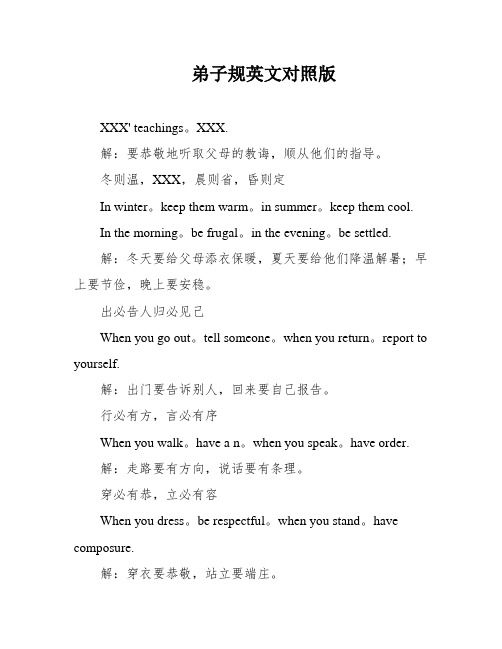
弟子规英文对照版XXX' teachings。
XXX.解:要恭敬地听取父母的教诲,顺从他们的指导。
冬则温,XXX,晨则省,昏则定In winter。
keep them warm。
in summer。
keep them cool.In the morning。
be frugal。
in the evening。
be settled.解:冬天要给父母添衣保暖,夏天要给他们降温解暑;早上要节俭,晚上要安稳。
出必告人归必见己When you go out。
tell someone。
when you return。
report to yourself.解:出门要告诉别人,回来要自己报告。
行必有方,言必有序When you walk。
have a n。
when you speak。
have order.解:走路要有方向,说话要有条理。
穿必有恭,立必有容When you dress。
be respectful。
when you stand。
have composure.解:穿衣要恭敬,站立要端庄。
扫、拂、治、饭,事事要亲力Sweep。
dust。
clean。
cook - do everything with your own hands.解:打扫、拂尘、整理、做饭,要亲手去做。
Do your best to XXX’ likes。
XXX解:尽力满足父母的喜好,小心避免触及他们的忌讳。
言语有权勿轻发恶语伤人心XXX。
XXX’ feelings。
解:言语具有强大的力量,不要轻率地说话,伤害他人的感情。
有则改勿忘过过则勉再努力If you make a mistake。
correct it and don’t et it。
If you’ve done well。
strive to do even better。
解:犯错要及时改正,不要忘记错误。
做好了一件事,要努力再接再厉。
When your parents are ill。
弟子规中英对照

弟子规圣人训首孝弟次谨信泛爱众而亲仁有余力则学文〈入则孝〉父母呼应勿缓父母命行勿懒父母教须敬听父母责须顺承冬则温夏则凊晨则省昏则定出必告反必面居有常业无变事虽小勿擅为苟擅为子道亏物虽小勿私藏苟私藏亲心伤亲所好力为具亲所恶谨为去身有伤贻亲忧德有伤贻亲羞亲爱我孝何难亲憎我孝方贤亲有过谏使更怡吾色柔吾声谏不入悦复谏号泣随挞无怨亲有疾药先尝昼夜侍不离床丧三年常悲咽居处变酒肉绝丧尽礼祭尽诚事死者如事生〈出则弟〉兄道友弟道恭兄弟睦孝在中财物轻怨何生言语忍忿自泯或饮食或坐走长者先幼者后长呼人即代叫人不在己即到称尊长勿呼名对尊长勿见能路遇长疾趋揖长无言退恭立骑下马乘下车过犹待百步余长者立幼勿坐长者坐命乃坐尊长前声要低低不闻却非宜近必趋退必迟问起对视勿移事诸父如事父事诸兄如事兄<谨〉朝起早夜眠迟老易至惜此时晨必盥兼漱口便溺回辄净手冠必正纽必结袜与履俱紧切置冠服有定位勿乱顿致污秽衣贵洁不贵华上循分下称家对饮食勿拣择食适可勿过则年方少勿饮酒饮酒醉最为丑步从容立端正揖深圆拜恭敬勿践阈勿跛倚勿箕踞勿摇髀缓揭帘勿有声宽转弯勿触棱执虚器如执盈入虚室如有人事勿忙忙多错勿畏难勿轻略斗闹场绝勿近邪僻事绝勿问将入门问孰存将上堂声必扬人问谁对以名吾与我不分明用人物须明求倘不问即为偷借人物及时还后有急借不难〈信〉凡出言信为先诈与妄奚可焉话说多不如少惟其是勿佞巧奸巧语秽污词市井气切戒之见未真勿轻言知未的勿轻传事非宜勿轻诺苟轻诺进退错凡道字重且舒勿急疾勿模糊彼说长此说短不关己莫闲管见人善即思齐纵去远以渐跻见人恶即内省有则改无加警唯德学唯才艺不如人当自砺若衣服若饮食不如人勿生戚闻过怒闻誉乐损友来益友却闻誉恐闻过欣直谅士渐相亲无心非名为错有心非名为恶过能改归于无倘掩饰增一辜凡是人皆须爱天同覆地同载行高者名自高人所重非貌高才大者望自大人所服非言大己有能勿自私人所能勿轻訾勿谄富勿骄贫勿厌故勿喜新人不闲勿事搅人不安勿话扰人有短切莫揭人有私切莫说道人善即是善人知之愈思勉扬人恶既是恶疾之甚祸且作善相劝德皆建过不规道两亏凡取与贵分晓与宜多取宜少将加人先问己己不欲即速已恩欲报怨欲忘报怨短报恩长待婢仆身贵端虽贵端慈而宽势服人心不然理服人方无言〈亲仁〉同是人类不齐流俗众仁者希果仁者人多畏言不讳色不媚能亲仁无限好德日进过日少不亲仁无限害小人进百事坏〈余力学文〉不力行但学文长浮华成何人但力行不学文任己见昧理真读书法有三到心眼口信皆要方读此勿慕彼此未终彼勿起宽为限紧用功工夫到滞塞通心有疑随札记就人问求确义房室清墙壁净几案洁笔砚正墨磨偏心不端字不敬心先病列典籍有定处读看毕还原处虽有急卷束齐有缺坏就补之非圣书屏勿视敝聪明坏心志勿自暴勿自弃圣与贤可驯致<总叙>弟子规圣人训首孝弟次谨信Di Zi Gui or standards for Being a Good Student and child is a book that was taught by Chinese saints and sages of the ancient past. The book first teaches us how to be dutiful to our parents, and how to be respectful and loving to our siblings. It then teaches us how to be cautious with all people, matters, and objects in our daily lives; how to be a trustworthy person; and to believe in the teachings of the ancient saints and sages.弟子规是中国古圣先贤的教诲。
《弟子规》(谨篇)——中英文双语含释义
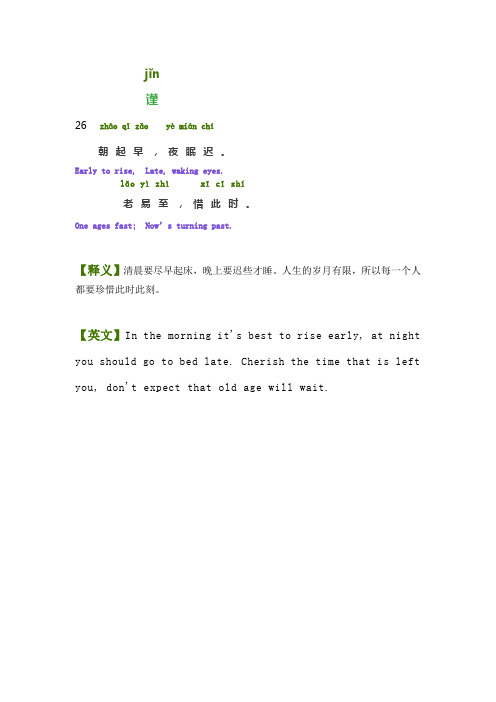
jǐn谨26zhāo qǐ zǎo yè mián chí朝起早,夜眠迟。
Early to rise, Late, waking eyes.lǎo yì zhìxī cǐ shí老易至,惜此时。
One ages fast; Now’s turning past.【释义】清晨要尽早起床,晚上要迟些才睡。
人生的岁月有限,所以每一个人都要珍惜此时此刻。
【英文】In the morning it's best to rise early, at night you should go to bed late. Cherish the time that is left you, don't expect that old age will wait.谨27chén bì guàn jiān shù kǒu晨必盥,兼漱口。
A morning bath, A cleaned mouth.biàn niào huí zhé jìng shǒu便尿回,辄净手。
At th’ toilet stand,Wash your hand.【释义】早晨一定要洗脸漱口。
大小便完后,要洗手。
【英文】First wash your face after rising, and next brush your teeth very well. After you go to the toilet, use water and soap on your hands.谨28guān bì zhèng niǔ bì jié冠必正,纽必结。
Being capped right,And buttoned tight.wà yǔ lǚ jù jǐn qiè袜与履,俱紧切。
弟子规(中英文对照)
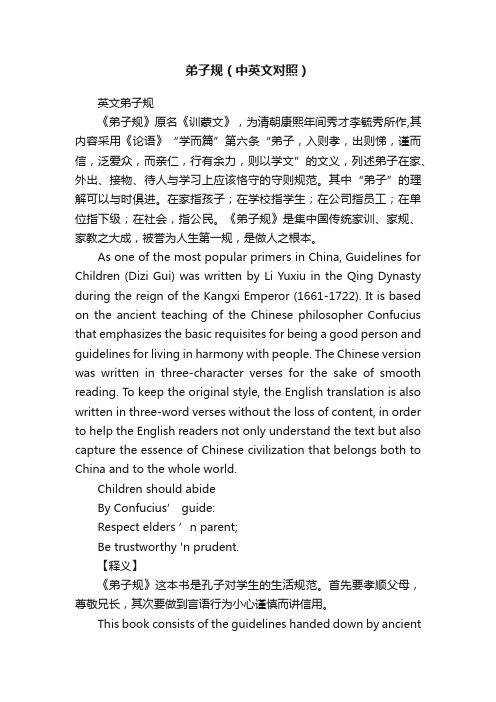
弟子规(中英文对照)英文弟子规《弟子规》原名《训蒙文》,为清朝康熙年间秀才李毓秀所作,其内容采用《论语》“学而篇”第六条“弟子,入则孝,出则悌,谨而信,泛爱众,而亲仁,行有余力,则以学文”的文义,列述弟子在家、外出、接物、待人与学习上应该恪守的守则规范。
其中“弟子”的理解可以与时俱进。
在家指孩子;在学校指学生;在公司指员工;在单位指下级;在社会,指公民。
《弟子规》是集中国传统家训、家规、家教之大成,被誉为人生第一规,是做人之根本。
As one of the most popular primers in China, Guidelines for Children (Dizi Gui) was written by Li Yuxiu in the Qing Dynasty during the reign of the Kangxi Emperor (1661-1722). It is based on the ancient teaching of the Chinese philosopher Confucius that emphasizes the basic requisites for being a good person and guidelines for living in harmony with people. The Chinese version was written in three-character verses for the sake of smooth reading. To keep the original style, the English translation is also written in three-word verses without the loss of content, in order to help the English readers not only understand the text but also capture the essence of Chinese civilization that belongs both to China and to the whole world.Children should abideBy Confucius’ guide:Respect elders ’n parent;Be trustworthy 'n prudent.【释义】《弟子规》这本书是孔子对学生的生活规范。
弟子规原文及翻译
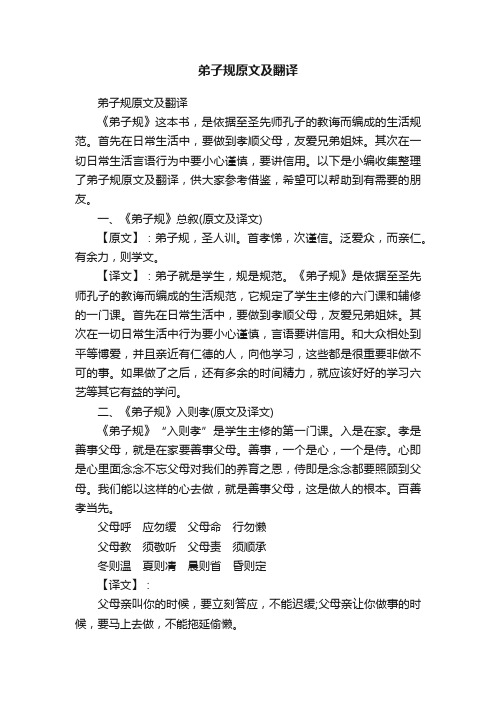
弟子规原文及翻译弟子规原文及翻译《弟子规》这本书,是依据至圣先师孔子的教诲而编成的生活规范。
首先在日常生活中,要做到孝顺父母,友爱兄弟姐妹。
其次在一切日常生活言语行为中要小心谨慎,要讲信用。
以下是小编收集整理了弟子规原文及翻译,供大家参考借鉴,希望可以帮助到有需要的朋友。
一、《弟子规》总叙(原文及译文)【原文】:弟子规,圣人训。
首孝悌,次谨信。
泛爱众,而亲仁。
有余力,则学文。
【译文】:弟子就是学生,规是规范。
《弟子规》是依据至圣先师孔子的教诲而编成的生活规范,它规定了学生主修的六门课和辅修的一门课。
首先在日常生活中,要做到孝顺父母,友爱兄弟姐妹。
其次在一切日常生活中行为要小心谨慎,言语要讲信用。
和大众相处到平等博爱,并且亲近有仁德的人,向他学习,这些都是很重要非做不可的事。
如果做了之后,还有多余的时间精力,就应该好好的学习六艺等其它有益的学问。
二、《弟子规》入则孝(原文及译文)《弟子规》“入则孝”是学生主修的第一门课。
入是在家。
孝是善事父母,就是在家要善事父母。
善事,一个是心,一个是侍。
心即是心里面念念不忘父母对我们的养育之恩,侍即是念念都要照顾到父母。
我们能以这样的心去做,就是善事父母,这是做人的根本。
百善孝当先。
父母呼应勿缓父母命行勿懒父母教须敬听父母责须顺承冬则温夏则凊晨则省昏则定【译文】:父母亲叫你的时候,要立刻答应,不能迟缓;父母亲让你做事的时候,要马上去做,不能拖延偷懒。
对父母的教诲,要恭敬地聆听;对父母的责备,要顺从地接受。
子女照料父母,冬天要让他们温暖,夏天要让他们清爽凉快。
早晨要向父母请安。
晚上要替他们铺好被子;伺候父母安眠。
出必告反必面居有常业无变事虽小勿擅为苟擅为子道亏物虽小勿私藏苟私藏亲心伤亲所好力为具亲所恶谨为去【译文】:出门要告诉父母一声,回来也要通报一声,以免父母挂念。
平时居住的地方要固定,选定的职业或立定的志向要努力去完成,不要轻易改变。
不要因为小事情,就不禀告父母而擅自去做。
《弟子规》中英文对照

弟子规(英文文字版)第一章:开宗明义章Chapter Principle And Explaining the Meaning弟子规,圣人训.首孝悌,次谨信。
泛爱众,而亲仁。
有余力,则学文.弟子规,圣人训。
这套为人子弟的规矩,是根据古代圣人的遗言编成的.The rules for being a student are instructions given by sages。
首孝悌,次谨信.首先要孝顺父母,尊敬兄长,其次要言行谨慎而有信用。
Of all rules,the first is respect, for your parents and all of your elders, learn to be careful andtrustworthy。
泛爱众,而亲仁。
要博爱众生,并且亲近仁者。
Be friendly and kind to all,draw near to people who are good。
有余力,则学文。
假如以上都能努力去实行,还有更多的能力,就应该研究学问。
Whatever time you have left should be devoted to learning。
第二章:孝Chapter Two:Filial Piety父母呼,应勿缓,父母命,行勿懒。
父母教,须敬听,父母责,须顺承.冬则温,夏则凊,晨则省,昏则定.出必告,反必面,居有常,业无变。
事虽小,勿擅为,苟擅为,子道亏。
物虽小,勿私藏,苟私藏,亲心伤。
亲所好,力为具,亲所恶,谨为去。
身有伤,贻亲忧,德有伤,贻亲羞。
亲爱我,孝何难,亲憎我,孝方贤。
亲有过,谏使更,怡吾色,柔吾声.谏不入,悦复谏,号泣随,挞无怨。
亲有疾,药先尝,昼夜侍,不离床。
丧三年,常悲咽,居处变,酒肉绝。
丧尽礼,祭尽诚,事死者,如事生。
父母呼,应勿缓,父母呼唤我们时,马上回答,不要迟缓。
When father and mother are calling, answer them right away。
《弟子规》诗词英译

《弟子规》诗词英译《弟子规》诗词英译父母呼,应勿缓。
父母命,行勿懒。
When your parents call you,You should answer without delay.When your parents ask you to do something,You should act immediately as your parents say.父母教,须敬听。
父母责,须顺承。
When your parents instruct you,You must listen to them respectfully.When your parents rebuke you,You must take their rebukes obediently.冬则温,夏则凊。
晨则省,昏则定。
You should make your parents enjoy warmth in winter,You should let them live in cool in summer.In the morning you should pay your respects to them,In the evening you should arrange them to slumber.出必告,返必面。
居有常,业无变。
Before you leave home, you must tell your parents about your leaving.As soon as you come back (home), you must report to them about your returning home.Your living quarters should be fixedAnd your profession should remain the same.。
《弟子规》(泛爱众篇)——中英文双语含释义
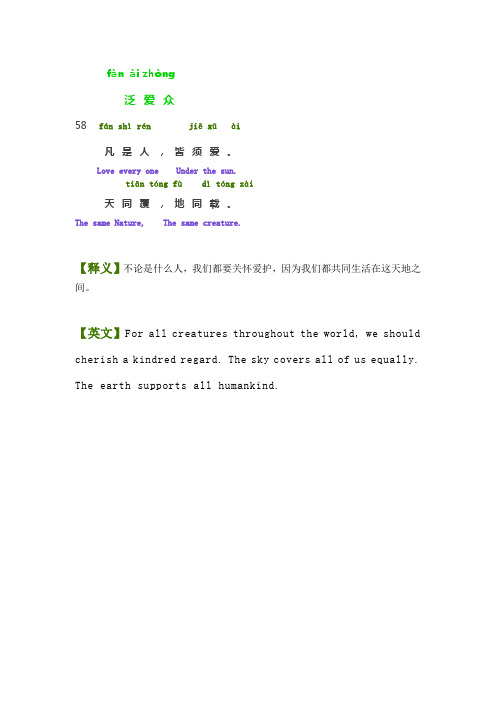
fàn ài zhòng泛爱众58fán shì rén jiē xūài凡是人,皆须爱。
Love every one Under the sun.tiān tóng fù dì tóng zài天同覆,地同载。
The same Nature, The same creature.【释义】不论是什么人,我们都要关怀爱护,因为我们都共同生活在这天地之间。
【英文】For all creatures throughout the world, we should cherish a kindred regard. The sky covers all of us equally. The earth supports all humankind.fàn ài zhòng泛爱众59xìng gāo zhě míng zì gāo行高者,名自高。
A great aim, A good name.rén suǒ zhòng fēi mào gāo人所重,非貌高。
What one seeks, Not good cheeks.【释义】一个品德高尚的人,名声自然高远。
人们所重视的,并不是一个人的相貌。
【英文】People whose conduct is fine are sure to have good reputations. Good conduct is what we respect; Fine looks cannot bring people honor.泛爱众60 cái dà zhěwàng zì dà才大者,望自大。
Great as such, Renowned as much.rén suǒ fúfēi yán dà人所服,非言大。
《弟子规》原文和翻译
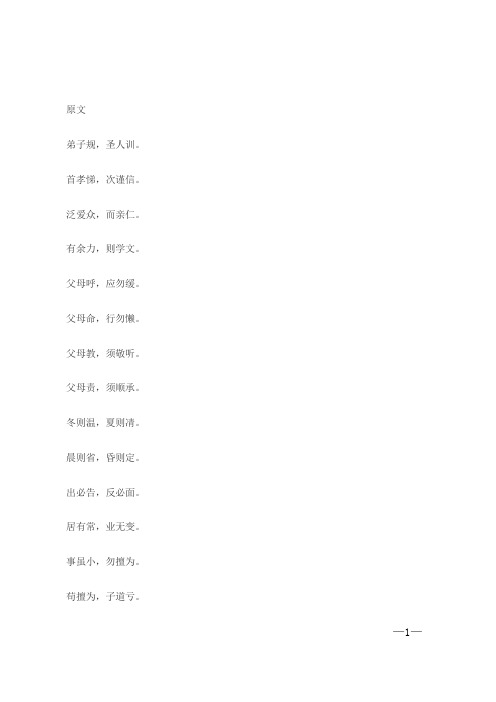
原文弟子规,圣人训。
首孝悌,次谨信。
泛爱众,而亲仁。
有余力,则学文。
父母呼,应勿缓。
父母命,行勿懒。
父母教,须敬听。
父母责,须顺承。
冬则温,夏则凊。
晨则省,昏则定。
出必告,反必面。
居有常,业无变。
事虽小,勿擅为。
苟擅为,子道亏。
—1—物虽小,勿私藏。
苟私藏,亲心伤。
亲所好,力为具。
亲所恶,谨为去。
身有伤,贻亲忧。
德有伤,贻亲羞。
亲爱我,孝何难。
亲憎我,孝方贤。
亲有过,谏使更。
怡吾色,柔吾声。
谏不入,悦复谏。
号泣随,挞无怨。
亲有疾,药先尝。
昼夜侍,不离床。
丧三年,常悲咽。
— 2 —居处变,酒肉绝。
丧尽礼,祭尽诚。
事死者,如事生。
兄道友,弟道恭。
兄弟睦,孝在中。
财物轻,怨何生。
言语忍,忿自泯。
或饮食,或坐走。
长者先,幼者后。
长呼人,即代叫。
人不在,己即到。
称尊长,勿呼名。
对尊长,勿见能。
路遇长,疾趋揖。
长无言,退恭立。
—3—骑下马,乘下车。
过犹待,百步余。
长者立,幼勿坐。
长者坐,命乃坐。
尊长前,声要低。
低不闻,却非宜。
进必趋,退必迟。
问起对,视勿移。
事诸父,如事父。
事诸兄,如事兄。
朝起早,夜眠迟。
老易至,惜此时。
晨必盥,兼漱口。
便溺回,辄净手。
冠必正,纽必结。
— 4 —袜与履,俱紧切。
置冠服,有定位。
勿乱顿,致污秽。
衣贵洁,不贵华。
上循分,下称家。
对饮食,勿拣择。
食适可,勿过则。
年方少,勿饮酒。
饮酒醉,最为丑。
步从容,立端正。
揖深圆,拜恭敬。
勿践阈,勿跛倚。
勿箕踞,勿摇髀。
缓揭帘,勿有声。
宽转弯,勿触棱。
—5—执虚器,如执盈。
入虚室,如有人。
事勿忙,忙多错。
勿畏难,勿轻略。
斗闹场,绝勿近。
邪僻事,绝勿问。
将入门,问孰存。
将上堂,声必扬。
人问谁,对以名。
吾与我,不分明。
用人物,须明求。
倘不问,即为偷。
借人物,及时还。
人借物,有勿悭。
凡出言,信为先。
— 6 —诈与妄,奚可焉。
话说多,不如少。
惟其是,勿佞巧。
奸巧语,秽污词。
市井气,切戒之。
见未真,勿轻言。
知未的,勿轻传。
事非宜,勿轻诺。
苟轻诺,进退错。
凡道字,重且舒。
《弟子规》英语翻译

出必告,返必面.
• Before going out, tell your parents where you are going, for parents are always concerned about their children.
• After returning home, go and see your parents to let them know you are back, so
亲爱我,孝何难,亲 恶我,孝方贤.
• When you have loving parents, it is not difficult to be a dutiful child.
• But if you are still dutiful to parents who hate you, you will meet the standards of the saints
亲有过,谏使更,怡 吾色,柔吾声.
•When your parents do wrong, urge them to change.
•Do it with a kind facial expression
谏不入,悦复谏,号 泣随,挞无怨.
• If they do not accept your advice, wait until they are in a happier mood before you dissuade them again, followed by crying to make them understand why.
• In the winter, keep your parents warm; in the summer, keep your parents cool.
《弟子规》(信篇)——中英文双语含释义
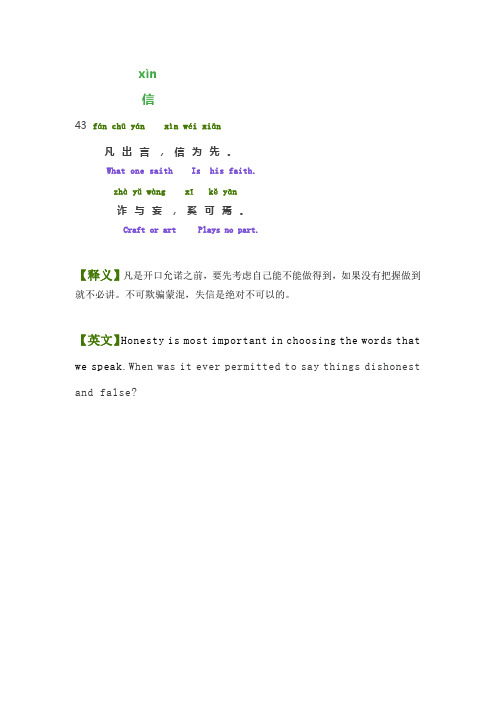
信43 fán chū yán xìn wéi xiān凡出言,信为先。
What one saith Is his faith.zhà yǔ wàng xīkě yān诈与妄,奚可焉。
Craft or art Plays no part.【释义】凡是开口允诺之前,要先考虑自己能不能做得到,如果没有把握做到就不必讲。
不可欺骗蒙混,失信是绝对不可以的。
【英文】Honesty is most important in choosing the words that we speak.When was it ever permitted to say things dishonest and false?信44 huà shuō duō bù rú shǎo话说多,不如少。
wéi qí shìwù nìng qiǎo惟其是,勿佞巧。
【释义】讲话不可太多,言多必失。
话要讲得恰当,要实事求是,不可花言巧语。
【英文】To talk just a little better than to chatter non-stop all day long. Stick to the facts and speak briefly; don't use cunning or flowery words.xìn信45 jiān qiǎo yǔ huì wū cí奸巧语,秽污词。
A glib tongue, An unfaithful one.shì jǐng qì qiè jiè zhī市井气,切戒之。
The worldly dust ,Evade you must.【释义】尖酸刻薄的话,下流的脏话,阿谀奉承之类小市民习气都要避免去沾染。
《弟子规》(亲仁篇)——中英文双语含释义
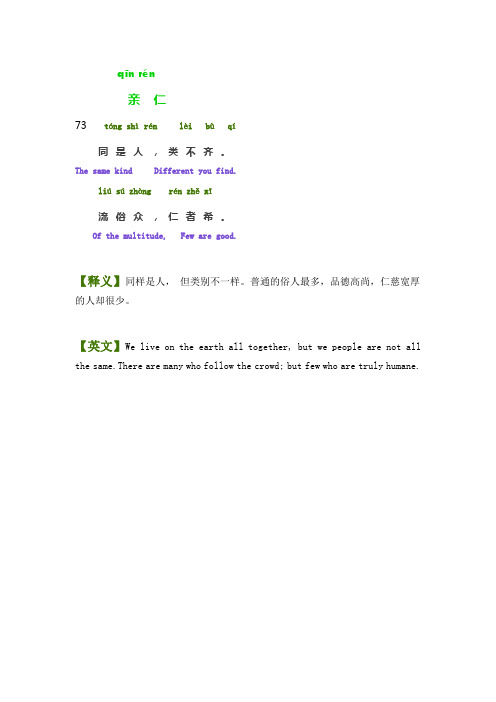
亲仁73tóng shì rén lèi bùqí同是人,类不齐。
The same kind Different you find.liú sú zhòng rén zhě xī流俗众,仁者希。
Of the multitude, Few are good.【释义】同样是人,但类别不一样。
普通的俗人最多,品德高尚,仁慈宽厚的人却很少。
【英文】We live on the earth all together, but we people are not all the same.There are many who follow the crowd; but few who are truly humane.亲仁74guǒ rén zhě rén duō wèi果仁者,人多畏。
Fair who appears May cause fears.yán bú huìsè bú mèi言不讳,色不媚。
A righteous one, He hides none!【释义】真正仁慈的人,大家都会敬畏他,因为他直言不讳,也不阿谀奉承。
【英文】Yet those who are truly humane, intimidate average souls.Because they're direct and outspoken, and because they won't flatter and please.qīn rén亲仁75néng qīn rén wú xiàn hǎo能亲仁,无限好。
Seeking who's kind Is good, unconfined.dérìjìn guò rìshǎo德日进,过日少。
《弟子规》(出则弟篇)——中英文双语含释义
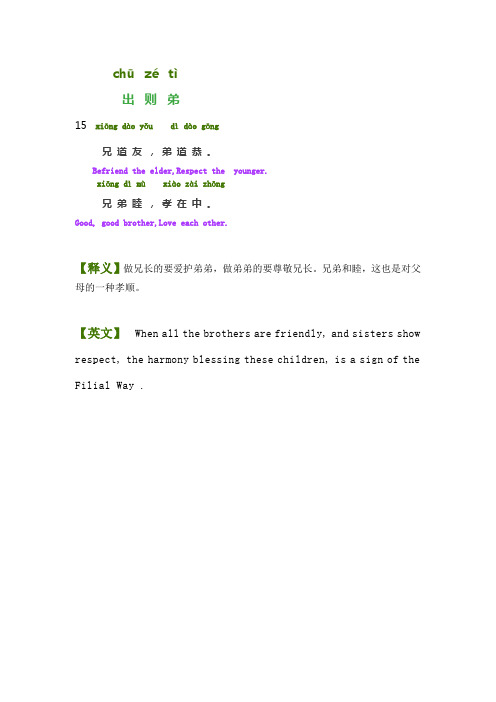
chūzétì出则弟15xiōng dào yǒu dì dào gōng兄道友,弟道恭。
Befriend the elder,Respect the younger.xiōng dì mù xiào zài zhōng兄弟睦,孝在中。
Good, good brother,Love each other.【释义】做兄长的要爱护弟弟,做弟弟的要尊敬兄长。
兄弟和睦,这也是对父母的一种孝顺。
【英文】When all the brothers are friendly, and sisters show respect, the harmony blessing these children, is a sign of the Filial Way .chūzétì出则弟16cái wù qīng yuàn hé shēng财物轻,怨何生。
Properties you despise;No disputes arise.yán yǔ rěn fèn zì mǐn言语忍,忿自泯。
Harshness you restrain;None will complain.【释义】把财物看得轻淡些,兄弟之间就不会相互怨恨,处处忍让、和颜爱语便不会引起忿怒。
【英文】If wealth is not viewed as essential, how could resentment arise? When words are both gentle and patient, bad feelings will soon disappear .出则弟17 huò yǐn shí huò zuò zǒu或饮食,或坐走。
弟子规中英文对照_推荐版
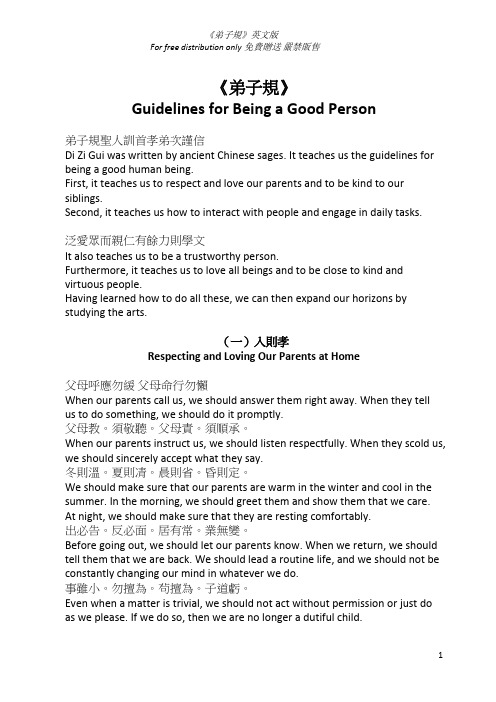
《弟子規》Guidelines for Being a Good Person弟子規聖人訓首孝弟次謹信Di Zi Gui was written by ancient Chinese sages. It teaches us the guidelines for being a good human being.First, it teaches us to respect and love our parents and to be kind to our siblings.Second, it teaches us how to interact with people and engage in daily tasks.泛愛眾而親仁有餘力則學文It also teaches us to be a trustworthy person.Furthermore, it teaches us to love all beings and to be close to kind and virtuous people.Having learned how to do all these, we can then expand our horizons by studying the arts.(一)入則孝Respecting and Loving Our Parents at Home父母呼應勿緩父母命行勿懶When our parents call us, we should answer them right away. When they tell us to do something, we should do it promptly.父母教。
須敬聽。
父母責。
須順承。
When our parents instruct us, we should listen respectfully. When they scold us, we should sincerely accept what they say.冬則溫。
弟子规英文对照版

《弟子规》英文对照版弟子规(STANDARDS FOR STUDENTS)(清)李毓秀撰《弟子规》,清代康熙时山西绛州人李毓秀所作。
李毓秀,字子潜,主要活动是教书。
根据传统对童蒙的要求,也结合他自己的教书实践,写成了《弟子规》。
全书以《论语·学而》中的“弟子入则孝,出则弟,谨而信,泛爱众,而亲仁。
行有余力,则以学文”开篇,对儿童言语行动提出要求,教以应该怎样待人处世,通常的核心思想是孝悌仁爱。
<总叙> Preface Outline弟子规圣人训首孝悌次谨信These standards for students are guidelines, handed down to us by Ancient Stages.First, obey and care for your parents, and then practice true brotherhood. 泛爱众而亲仁有余力则学文Learn to be careful and honest, and cherish all living beings.Draw near to good-hearted people, and study whenever you can.解:首先,在日常生活中要做到孝敬父母,友爱兄弟姐妹,其次一切言行中,要谨慎,要讲信用;和大众交往时要平等仁和,要时常亲近有仁德的人,向他学习。
以上这些事是学习的根本,非做不可。
如果做了还有余暇,更应努力地学习礼、乐、射、御、书、术等六艺,各种经典,以及其他有益的学问。
第一章孝(On Being Filial At Home)父母呼应勿缓父母命行勿懒When mother and father are calling, answer them right away.When they give you instructions, obey them without hesitation.解:父母呼唤的时候,要立刻答应;父母要你做事的时候,要马上去做,不要偷懒。
- 1、下载文档前请自行甄别文档内容的完整性,平台不提供额外的编辑、内容补充、找答案等附加服务。
- 2、"仅部分预览"的文档,不可在线预览部分如存在完整性等问题,可反馈申请退款(可完整预览的文档不适用该条件!)。
- 3、如文档侵犯您的权益,请联系客服反馈,我们会尽快为您处理(人工客服工作时间:9:00-18:30)。
弟子规(英文文字版)第一章:开宗明义章Chapter Principle And Explaining the Meaning弟子规,圣人训。
首孝悌,次谨信。
泛爱众,而亲仁。
有余力,则学文。
弟子规,圣人训。
这套为人子弟的规矩,是根据古代圣人的遗言编成的。
The rules for being a student are instructions given by sages.首孝悌,次谨信。
首先要孝顺父母,尊敬兄长,其次要言行谨慎而有信用。
Of all rules, the first is respect, for your parents and all of your elders, learn to be careful andtrustworthy.泛爱众,而亲仁。
要博爱众生,并且亲近仁者。
Be friendly and kind to all, draw near to people who are good.有余力,则学文。
假如以上都能努力去实行,还有更多的能力,就应该研究学问。
Whatever time you have left should be devoted to learning.第二章:孝Chapter Two: Filial Piety父母呼,应勿缓,父母命,行勿懒。
父母教,须敬听,父母责,须顺承。
冬则温,夏则凊,晨则省,昏则定。
出必告,反必面,居有常,业无变。
事虽小,勿擅为,苟擅为,子道亏。
物虽小,勿私藏,苟私藏,亲心伤。
亲所好,力为具,亲所恶,谨为去。
身有伤,贻亲忧,德有伤,贻亲羞。
亲爱我,孝何难,亲憎我,孝方贤。
亲有过,谏使更,怡吾色,柔吾声。
谏不入,悦复谏,号泣随,挞无怨。
亲有疾,药先尝,昼夜侍,不离床。
丧三年,常悲咽,居处变,酒肉绝。
丧尽礼,祭尽诚,事死者,如事生。
父母呼,应勿缓,父母呼唤我们时,马上回答,不要迟缓。
When father and mother are calling, answer them right away.父母命,行勿懒。
父母吩咐我们时,马上去做,不要偷懒。
When they give you directions, obey them without hesitation.父母教,须敬听,父母教导我们时,必须恭敬地听从。
When your parents need to instruct you, respectfully do as you're told.父母责,须顺承。
父母责备我们时,必须温驯地接受。
Whenever your parents must scold you, acknowledge your errors and faults.冬则温,夏则凊,冬寒的时候,要设法令父母保持温暖;暑热的季节,要设法使父母感觉凉爽。
On cold winter days, we should try to keep our parents warm.And on hot summer days, we should try to make our parents feel cool.晨则省,昏则定。
清晨要去向父母请安问好;夜晚就去帮父母铺床理被。
In the morning, we should greet our parents.At night, we should arrange the blankets and bedding for our parents.出必告,反必面,出门时,一定要先禀告父母;回来后,一定要再觐见父母。
When we go out, we should tell our parents.After coming home, we should see our parents again.居有常,业无变。
居住要有固定的处所,职业不要经常地变更。
We should reside at a fixed place and not constantly change jobs.事虽小,勿擅为,即使是再小的事情,也不可任意妄为。
No matter how small the affair, do not act just as you please.苟擅为,子道亏。
如果任意妄为,就亏损了人子的孝道。
If you act just as you please, then you have not performed as a dutiful child should.物虽小,勿私藏,纵然是再小的东西,也不可私自藏起。
Although a thing may be small, do not save it for yourself.苟私藏,亲心伤。
如果私自藏起,就伤害了父母的心意。
If you hoard things for yourself, your parents' hearts will be grieved.亲所好,力为具,父母亲喜好的事物,要尽力地替父母亲准备周全。
Whatever your parents like, you should earnestly try to provide for them.亲所恶,谨为去。
父母亲所厌恶的事物,要谨慎地为父母亲去除净尽。
Whatever your parents dislike, you should carefully try to remove for them.身有伤,贻亲忧,身体如果有毁伤,会带给父母亲忧虑;If you carelessly injure your body, you bring worry and fret to your parents.德有伤,贻亲羞。
品德如有缺失,会带给父母亲羞辱。
If you heedlessly damage your virtue, you bring shame and disgrace to your parents.亲爱我,孝何难,若父母亲慈爱我,我能尽孝,这又有什么困难呢?If parents are loving and kind, of course it’s not hard to be filial.亲憎我,孝方贤。
若父母亲憎恶我,还能尽孝,那才是真正贤德啊!If parents are hateful and cruel, then it’s truly to be filial.亲有过,谏使更,父母若有过失,要劝告父母改正。
If we recognize faults in our parents, we should exhort them to change for the better.怡吾色,柔吾声。
劝的时候,脸色要欢愉,声音要柔和。
While speaking to them, we should be gentle in appearance , and soften our tone.谏不入,悦复谏,如父母不接受劝告,就等到父母心情好时再劝。
If they cannot accept our advice, wait for better opportunities to exhort them again and again.号泣随,挞无怨。
即使劝到声泪俱下,或者被打,内心也不怨恨。
Even while exhorting them through tears, or if punished, we still will not complain.亲有疾,药先尝,父母亲有疾病时,所服用的汤药都要先检查过;When parents are sick, examine the medicine before giving the dosage.昼夜侍,不离床。
不论白天夜晚都侍奉着,不离开父母的床边。
Wait on them day and night, without ever leaving their bedside.丧三年,常悲咽,为父母亲守丧三年,经常哀恸饮泣;During the three-year mourning period for one is deceased parents, one should constantly think ofthem with sorrow.居处变,酒肉绝。
起居作息的方式改变,宴饮食肉的活动戒止。
One should change one’s usual ways of dwelling and doing things, and refrain from consumingalcohol and meat.丧尽礼,祭尽诚,办理丧事要合乎礼节,进行祭典要出自至诚;Make sure that the funeral arrangements accord with the rites, and whole-heartedly make offeringson their behalf.事死者,如事生。
敬事去世的祖先,一如祖先在世的时候。
One should respectfully serve one’s departed ancestors as if they were still alive.\第三章:悌Chapter Three: Fraternity兄道友,弟道恭,兄弟睦,孝在中。
财物轻,怨何生,言语忍,忿自泯。
或饮食,或坐走,长者先,幼者后。
长呼人,即代叫,人不在,己先到。
称尊长,勿呼名,对尊长,勿见能。
路遇长,疾趋揖,长无言,退恭立。
骑下马,乘下车,过犹待,百步余。
长者立,幼勿坐,长者坐,命乃坐。
尊长前,声要低,低不闻,却非宜。
事诸父,如事父,事诸兄,如事兄。
兄道友,弟道恭,做为兄长要友爱,身为弟弟须恭顺;The way of an older brother should be gentle, just as younger brother should be respectful.兄弟睦,孝在中。
兄弟和睦相处,孝道自然存乎其中。
If brothers and sisters get along harmoniously, then it is clear they know how to be filial.财物轻,怨何生,钱财物品若看得很轻,嫌怨又哪里会产生?If we do not think of wealth as important, how could resentment arise?言语忍,忿自泯。
言谈之间能忍让谦和,忿恨自然消灭无踪。
When words are both gentle and patient, bad feelings will naturally disappear.或饮食,或坐走,无论吃喝,或是行走坐卧;While eating or drinking, or when walking or sitting.长者先,幼者后。
